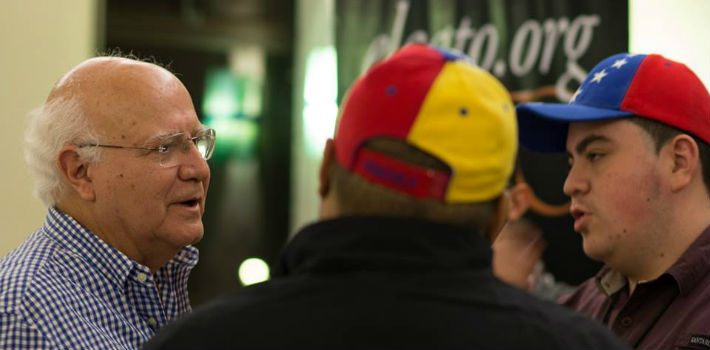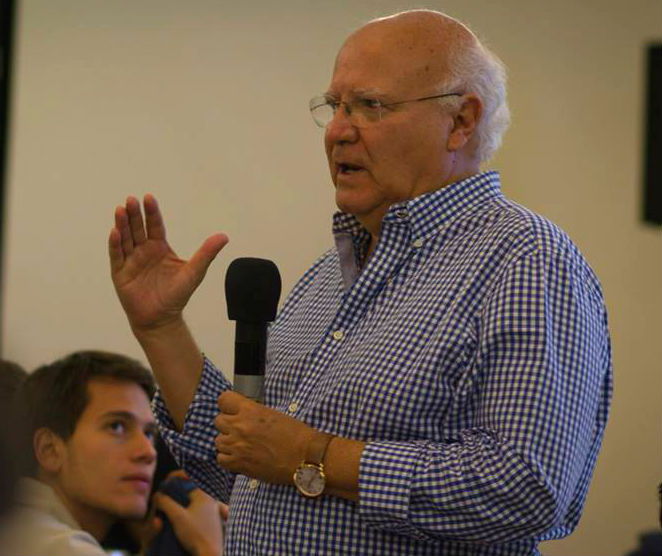
EspañolEconomist Manuel Hinds was El Salvador’s minister of finance between 1994 and 1999, and is heralded as the mastermind behind the country’s 2000-2001 dollarization.
Hinds maintains that Venezuela’s currency-exchange crisis is largely due to the manipulation of the country’s national currency, the bolívar, through money printing and artificial interest rates set by the central bank. “Why would [Nicolás] Maduro want US dollars if he has the wonderful ability to create bolívares fuertes at will?” he questioned in an article written about President Maduro’s tour around the world seeking financial aid. “The obvious answer is because no one accepts them in exchange for goods, unless you live in Venezuela and the government forces you to use them.”
In January, he spoke at Cato University in Costa Rica, where the PanAm Post interviewed him about Venezuela’s currency problems. Hinds believes the South American nation should move toward dollarization to get out from under its problems with inflation, devaluation, and the accelerated impoverishment of its people.
Would dollarization solve Venezuela’s currency exchange problem?
Dollarization can be one solution, but a solution for whom is an important question. It could have definitely prevented the current crisis. Thanks to high oil prices years ago, the country experienced an extraordinary economic boom and the public believed they’d be rich forever.
The actions of the US Federal Reserve affect us all, whether or not we have a national currency, because that’s how the market operates today.
So, on top of spending the cash that was coming in — in contrast to other countries like Chile and Norway that put it aside as savings for the hard times — the government printed more money and used up a big chunk of the nation’s reserves.
Printing money and spending it on imports, at the expense of reserves, creates a terribly harmful cycle. The boom economy goes bust when the reserves run out. That’s why dollarization ensures long-term stability. It takes away politicians’ ability to manipulate the currency. It’s a way of telling them: “We’re shutting down the central bank and never again will you be able to do what you have always done to us.”
Would that be a likely scenario for Chavismo?
In El Salvador we have a populist government that is destroying the state’s finances, but nevertheless the economy is stable because politicians have no control over the currency’s value.
When you have a dollarized economy, incurring debt becomes more difficult because the government has to resort to the international markets. It cannot ask the central bank to print money.
Capital would flee from any Latin-American country if their president, like in El Salvador, travels to Venezuela and tells Maduro “you’re my Comandante.” People would anticipate a currency devaluation. But in El Salvador, there has been no flight of capital. There may be small ones during the elections, but they return because it’s a safe investment, and investors believe the country is not going to abandon the US dollar.
So what you’re saying is that dollarization wouldn’t fix Maduro’s government, that it would limit his grip on the economy?
It would be an adjustment, because politicians then immediately understand they cannot create dollars out of thin air. They will have to manage with the existing money [in the economy.] And since the public is also aware of this, interest rates go down.
The big upside is that if interest rates go down, investment is encouraged in the very long term, and profits from financial mediation drops. That is to say, banks earn a profit based on their efficiency, not so much from lending money. In El Salvador, the banks’ profit from borrowed money is much lower than the rest of Central America.
Before dollarization, there must be a cooling off period, where the government stops printing bolívares and allows relative prices to adjust.
If [the Maduro administration] were to dollarize Venezuela and act accordingly, they would fix a lot of problems. Shortages would be solved and the economy would be set in motion again. But they will not do it, because for them the US dollar is the devil.
If there is a change in government — either through an election, or the Virgin Mary somehow enlightens the current one — and they say, “We need to put this country back on its feet,” then countless measures will need to be taken.
First, the government needs to stabilize the currency and the economy. If it dollarized Venezuela, expectations would change and people would say, “Now they mean business, and we won’t have inflation again.”
The alternative is to create yet a new currency, a “bolívar fuertísimo,” but who is going to fall for that? A currency is strong because people demand it, and that’s why dollarization is the easiest way out for Venezuela.
But how would people’s income be adjusted if the monthly minimum wage barely reaches US$30?

They had that problem in Ecuador, and I think they solved it the wrong way. The Ecuadorian government dollarized the economy overnight [in 2000], but they modified the exchange rate over the following six months. They devaluated the Ecuadorian dollar gradually so that relative prices would adjust themselves.
In Venezuela’s case, where some prices are going up much faster than others, the gap is huge because people can’t afford to live on black-market rates. For instance, a belt can be more expensive than any jewelry because relative prices have not been adjusted yet.
Before dollarization, there must be a cooling off period, where the government stops printing bolívares and allows relative prices to adjust, and the dollar rate to drop. Salaries in dollars will rise, and the gap won’t be that wide. But because of the current situation, it’s not the time to dollarize overnight.
Besides money printing, isn’t speculation on Venezuela’s political crisis also affecting the currency?
Yes, when expectations change, the speculations will stop, and the black-market dollar rate will drop substantially.
Won’t dollarization bring with it the risk of depending on the US Federal Reserve?
We depend on it anyway! Venezuela more than other countries, because it has managed its policies so badly that their own currency is worthless, and now it needs foreign financial aid. The actions of the US Federal Reserve affect us all, whether or not we have a national currency, because that’s how the market operates today.
If you compare a chart of international commodity prices with US imports you will see that the two are closely linked. So when the United States buys a lot, the rest of the world grows. For instance, China increases its exports to the United States and thus imports more raw material from Latin America. What I’m saying is anathema to [Latin-American] progressives. They don’t realize that China is really just a middleman to sell to the United States, and that Latin America is better off when the United States buys more. We are already dependent on the United States.
Translated by Daniel Duarte. Edited by Guillermo Jimenez.
 Versión Español
Versión Español












